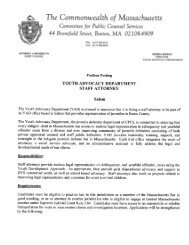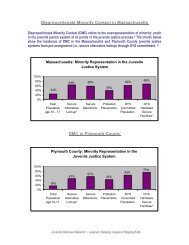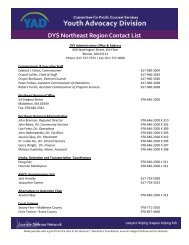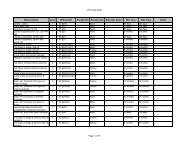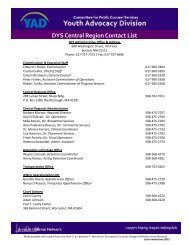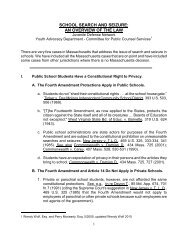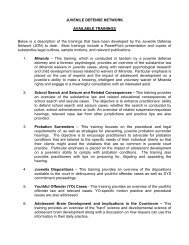States rethink 'adult time for adult crime' - the Youth Advocacy Division
States rethink 'adult time for adult crime' - the Youth Advocacy Division
States rethink 'adult time for adult crime' - the Youth Advocacy Division
You also want an ePaper? Increase the reach of your titles
YUMPU automatically turns print PDFs into web optimized ePapers that Google loves.
New research shows stark differences in teen brains<br />
imaging studies that first detected <strong>the</strong> middle school growth spurt, said <strong>the</strong> new<br />
understanding of teen brains "argues <strong>for</strong> doing a lot of things as a teenager. You are<br />
hard-wiring you brain in adolescence. Do you want to hard-wire it <strong>for</strong> sports and<br />
playing music and doing ma<strong>the</strong>matics, or <strong>for</strong> lying on <strong>the</strong> couch in front of <strong>the</strong><br />
television"<br />
The new understanding of adolescent brains leads to questions of ethics and<br />
legalities.<br />
The Supreme Court already has decided that people should not be executed <strong>for</strong><br />
crimes committed when <strong>the</strong>y were age 15 or younger, and in <strong>the</strong> fall is scheduled to<br />
consider whe<strong>the</strong>r <strong>the</strong> restriction should be extended to everyone under 18.<br />
Two years ago, <strong>the</strong> court banned execution of mentally retarded people because of<br />
deficiencies that "diminish <strong>the</strong>ir personal culpability."<br />
"With <strong>the</strong> new biological explanation that adolescent brains are different, we think<br />
<strong>the</strong>re's scientific evidence that <strong>the</strong>y, too, are less culpable," said Stephen Harper, an<br />
adjunct professor of juvenile justice at <strong>the</strong> University of Miami School of Law who<br />
specializes in capital cases.<br />
Gur said some scientists would put off <strong>the</strong> age of legal majority to 22 or 23, and said<br />
<strong>the</strong>re will likely be considerable debate over how to tell when a person's brain<br />
physically looks like an <strong>adult</strong>'s as imaging research continues and ef<strong>for</strong>ts to set<br />
standards and norms develop.<br />
Fassler predicts that within a decade, brain images will be sophisticated enough to<br />
"help us determine <strong>the</strong> age <strong>for</strong> appropriate treatment of addictions and <strong>the</strong>rapy<br />
models <strong>for</strong> <strong>adult</strong>s and adolescents with disorders."<br />
O<strong>the</strong>r researchers say that while it's possible to gain general understanding about<br />
brain development and function from <strong>the</strong> images, <strong>the</strong> notion that medicine, law<br />
en<strong>for</strong>cement or anyone else should work from some ideal, normal brain model is<br />
troubling.<br />
"Each individual is not an exact map, and <strong>the</strong> difficulties in determining what <strong>the</strong><br />
range of variations are is really dangerous. The data is incredibly easy to be overinterpreted,"<br />
said Sonia Miller, a New York attorney who specializes in cases dealing<br />
with new technologies.<br />
Some courts are already accepting brain scans as evidence of a person's mental<br />
capacity in criminal cases, she said, and "as <strong>the</strong> neuroscience of intentional behavior<br />
develops, <strong>the</strong> way we assign responsibility and blame will be challenged. This raises<br />
a lot of questions about how much neural privacy can we expect, how much <strong>the</strong><br />
authorities can get into your brain."<br />
Dr. Peter Bandettini, a brain-imaging researcher at <strong>the</strong> National Institutes of Health,<br />
said <strong>the</strong> science of understanding what small structures and chemicals are doing<br />
within <strong>the</strong> brain is far from a gold standard <strong>for</strong> mental function or age.<br />
"Right now, I personally think you'd get more in<strong>for</strong>mation about a person's mental<br />
age by going to a set of behavioral tests. But I'd agree that as <strong>the</strong>se technologies<br />
become more powerful, <strong>the</strong>re's going to be a greater need <strong>for</strong> checks and balances<br />
to determine how <strong>the</strong> imaging in<strong>for</strong>mation should be used."<br />
On <strong>the</strong> Net:<br />
●<br />
●<br />
●<br />
●<br />
http://www.nimh.nih.gov/<br />
http://www.dana.org/<br />
http://www.aap.org/<br />
http://www.psych.org/<br />
file:///L|/JDN/Brain%20Resources/Brain%20Development/...0shows%20stark%20differences%20in%20teen%20brains.htm (3 of 4)8/16/2006 4:42:07 PM




